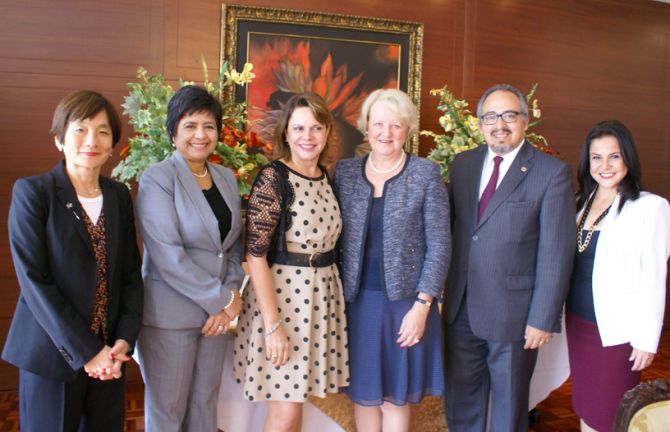

Update
Vice-President of Costa Rica commits to an approach to the AIDS response based on human rights
10 November 2014
10 November 2014 10 November 2014The Vice-President of Costa Rica, Ana Helena Chacón, committed to ensuring access to inclusive HIV services and to promoting respect for human rights during a meeting with UNAIDS Deputy Executive Director Jan Beagle, held on 6 November at the Presidential Palace in San José, Costa Rica.
According to Ms Chacón, it is necessary to strengthen legal and social environments in order to promote human rights and remove barriers to accessing HIV testing, treatment and prevention services as well as social protection for the key populations most vulnerable to HIV. In Costa Rica, men who have sex with men are the most affected population, with an HIV prevalence of 10.9% compared to 0.3% among the general population. The Vice-President noted that social justice and inclusion are critical to ending the AIDS epidemic in the country by 2030.
Early last week, a bill to amend the national law on HIV was presented to the Legislative Assembly for discussion. The new bill intends to decriminalize HIV transmission and to reform the Penal Code to ensure legal protection against discrimination based on sexual orientation or gender identity.
Ms Beagle recognized the leadership that Costa Rica has shown in the AIDS response and noted its progress on the path to eradicating stigma and discrimination. She also commended the country for its efforts in scaling up HIV services to prevent new HIV infections among children and urged accelerated action in order for Costa Rica to become one of the first Latin American countries to reach zero new HIV infections among newborn children by 2015.
Quotes
“With this bill we will make an important step forward to end stigma and discrimination.”
“With sustained commitment to protecting human rights, especially among the most vulnerable populations, Costa Rica can be a model of success in the response to AIDS.”



